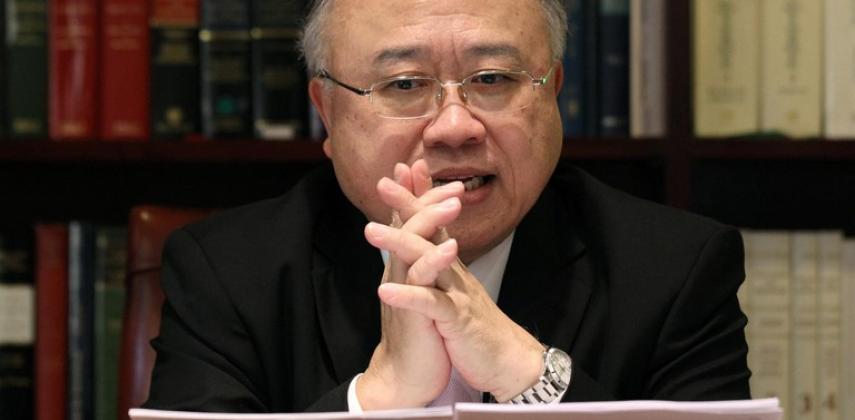The development of Hong Kong into an intellectual property (IP) trading hub will drive job growth in the city’s creative and technological sectors, in addition to providing benefits to directly related intermediary services such as law, accountancy, finance and brokerage, says a senior government adviser.
Andrew Liao Cheung-sing, a nonofficial member of the Executive Council and vice-chairman of the government’s Working Group on Intellectual Property Trading (WGIPT), also says professionals need to upgrade their skills in order to best take advantage of government efforts to promote Hong Kong.
IP trading refers to the buying, selling or licensing of the legal rights – from fictional characters to technological innovations – between two parties. It allows businesses on the receiving end to gain access to another organisation’s IP to enhance products and services.
Meanwhile, companies on the giving end of IP trading can generate income from IP no longer in use, or in markets outside their sphere of influence. Its promotion in Hong Kong was championed by Chief Executive Leung Chun-ying in his policy address in 2013.
There is already significant activity within the market. In 2010, the latest year for which official statistics are available, Hong Kong exported US$1.1 billion in technology to mainland China, making it the sixth largest exporter in the world to do so.
Most transactions in Hong Kong are bilateral – conducted between buyers and sellers without the intervention of middlemen. Liao, a barrister who practices in the field of IP law, says that the challenge for Hong Kong is in centralising IP trading to provide a transparent marketplace to foster liquidity.
Liao says job creation will depend on the degree to which Hong Kong is successful in establishing itself as a global IP trading hub and in driving local developmental growth in industries which generate IP. This includes developing designers and artists operating across the cultural spectrum within creative fields such as in fashion, architecture, music, movies, broadcast and entertainment.
Another group which stands to benefit includes researchers, inventors and innovators – those who develop or adapt new technology in response to market demand.
“IP trading is like a catalyst. In itself, it may not require a lot of people. [At first], the skills to work in it will favour high-end professionals, but once that starts to become successful, it will drive growth and development in cultural creative industries and in innovation and technology,” Liao says. He adds that transaction growth will also drive other industries which service people who conduct IP trading, such as the legal, accounting, valuation, finance, insurance and arbitration professions.
Some professions – such as the legal and accountancy sectors – are more ready to benefit from growth in IP trading than others, he says. “We have the human resources available, but it’s about upgrading them,” he points out.
For example, valuation professionals in Hong Kong need to be better equipped to rate intangible assets in addition to physical ones, while insurers are not familiar enough with risks associated in dealing with IP trading transactions. “There are talent gaps, and in some professions the gaps are bigger than others,” Liao says.
He adds that while local talent can be readily supplemented by qualified professionals from overseas, the longerterm solution would require investing in training and development – especially among universities and postgraduate education providers.
Goggles Pang, executive director of HKIPEx, an online IP broker, says Hong Kong’s development in IP trading will lead to more jobs, but only if the government can provide more funding and strategy support. “Growth could be huge if the government can facilitate standardisation within the industry,” he says.
As one of the larger IP brokers, HKIPEx employs some 30 people, comprising about 10 marketing and business development professionals, and 20 technical staff including developers, programmers and designers. Pang expects growth in IP trading will lead to demand for both technical and sales-related roles at local IP brokers. Currently, there are at least three such platforms: HKIPEx, IPEXC and HKIPX. A fourth, non-profit platform, Asia IP Exchange, is run by the Hong Kong Trade Development Council.
Wu Po Chi, adjunct professor at the Hong Kong University of Science and Technology’s School of Engineering and School of Business and Management, is a fellow member of the WGIPT. He expects the rising importance of IP trading to drive demand for skills related to technology patents, such as patent strategy, litigation, defence and acquisition.
Wu adds that China’s rise as a technological power has resulted in more IP disputes with developed nations such as the US. Hong Kong is therefore well placed to act as a centre for arbitration, mediation and IP trading.
“The Chinese government recognises Hong Kong’s rule of law, and objective legal system are a critical bridge between Chinese and Western firms,” Wu says. “The opportunity for us is to build on this position, by attracting and developing the talent needed.”


